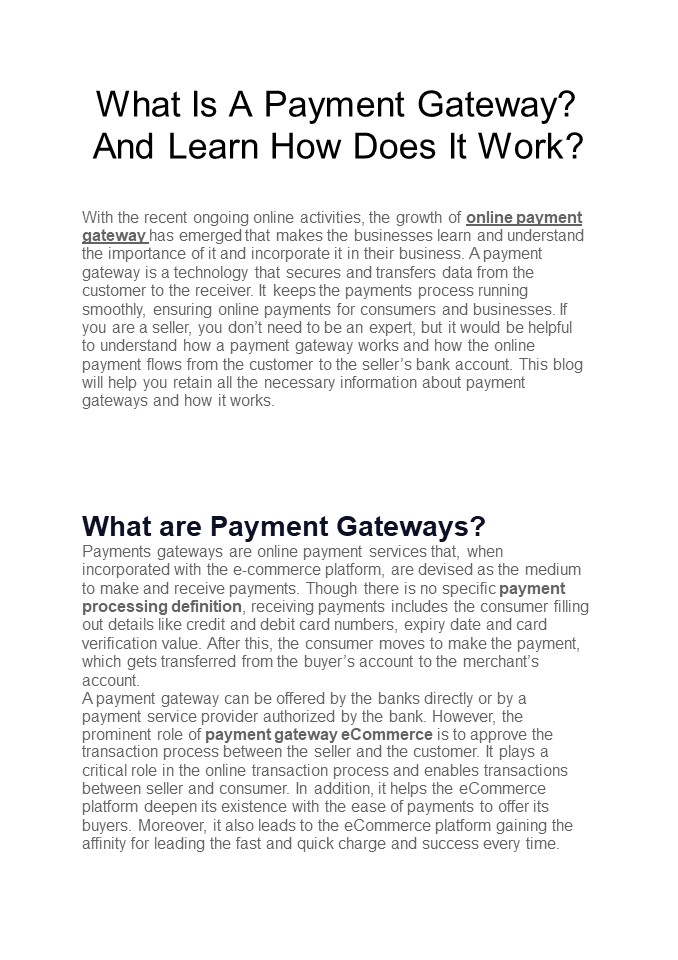Online Payment Gateway - PowerPoint PPT Presentation
Title:
Online Payment Gateway
Description:
Spay Live provides you best online payment gateway. – PowerPoint PPT presentation
Number of Views:3
Title: Online Payment Gateway
1
What Is A Payment Gateway? And Learn How Does It
Work?
With the recent ongoing online activities, the
growth of online payment gateway has emerged
that makes the businesses learn and understand
the importance of it and incorporate it in their
business. A payment gateway is a technology that
secures and transfers data from the customer to
the receiver. It keeps the payments process
running smoothly, ensuring online payments for
consumers and businesses. If you are a seller,
you dont need to be an expert, but it would be
helpful to understand how a payment gateway
works and how the online payment flows from the
customer to the sellers bank account. This blog
will help you retain all the necessary
information about payment gateways and how it
works.
What are Payment Gateways? Payments gateways are
online payment services that, when incorporated
with the e-commerce platform, are devised as the
medium to make and receive payments. Though
there is no specific payment processing
definition, receiving payments includes the
consumer filling out details like credit and
debit card numbers, expiry date and card
verification value. After this, the consumer
moves to make the payment, which gets
transferred from the buyers account to the
merchants account. A payment gateway can be
offered by the banks directly or by a payment
service provider authorized by the bank. However,
the prominent role of payment gateway eCommerce
is to approve the transaction process between the
seller and the customer. It plays a critical role
in the online transaction process and enables
transactions between seller and consumer. In
addition, it helps the eCommerce platform deepen
its existence with the ease of payments to offer
its buyers. Moreover, it also leads to the
eCommerce platform gaining the affinity for
leading the fast and quick charge and success
every time.
2
Why Do We Need A Payment Gateway?
- Some of you might think of a payment gateway as
only an intermediary, but before we can find the
perfect answer to why we need a payment gateway,
lets recall that online payment is processed
without physical card transaction. The customer
card is not physically used on a POS terminal.
With online payment, the merchant depends
entirely on the card information the customer
enters on the payment page. But how can a person
be sure that the customer is using this card?
There are higher chances of fraud in this type
of payment mode, and here the payment gateway
does its magic. - A payment gateway acts as a gatekeeper of the
customers data. For - online merchants, a payment gateway transmits the
information from the buyer, the seller, to the
acquirer and the issuing bank using data
encryption to prevent unwanted threats. Moreover,
a payment gateway protects merchants from
expired cards, insufficient funds, exceeding
credit limits and closed accounts.
How Does The Payment Gateway Work? The
functioning of gateway service web payment
follows a set of processes for settling the
amount every time. And it happens when a
customer orders a service or product from a
payment gateway-enabled seller. From filling out
the card details to finally making the payment
into the merchant account, the payment gateway
goes through several steps. Below we have listed
out the steps, but before that, there are some
terms that you must understand- Merchant
Account- As a business owner, you will need a
payment gateway and a merchant
3
account to accept online transactions. A merchant
account is a different bank account that
businesses use for receiving their payments.
During a transaction, the customers amount is
initially transferred to the merchant account,
which remains until you move it to your regular
bank account. Payment Processor- Now lets move
on to the payment processing definition mentioned
below. A payment processor is a service that
authorizes the customers card details to ensure
they have enough funds in their account. The
payment processor approves the transaction, and
the payment is deposited to the merchant
account, and if the balance is insufficient,
then the transaction is rejected.































